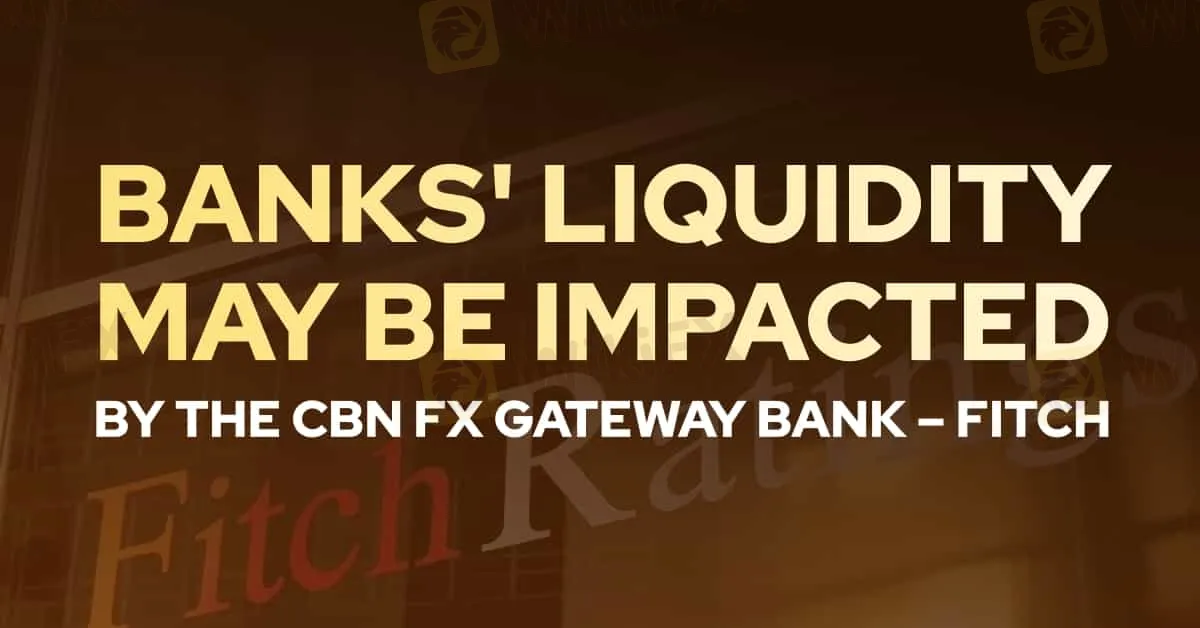简体中文
繁體中文
English
Pусский
日本語
ภาษาไทย
Tiếng Việt
Bahasa Indonesia
Español
हिन्दी
Filippiiniläinen
Français
Deutsch
Português
Türkçe
한국어
العربية
BANKS' LIQUIDITY MAY BE IMPACTED BY THE CBN FX GATEWAY BANK – FITCH
Abstract:According to credit Ratings, the Central Bank of Nigeria's proposed foreign currency gateway bank could negatively impact the liquidity of Nigerian banks.

According to credit Ratings, the Central Bank of Nigeria's proposed foreign currency gateway bank could negatively impact the liquidity of Nigerian banks.
This was revealed in the most recent Fitch Ratings examination of Nigerian banks.
The governor of the apex bank, Dr. Olayemi Cardoso, has announced plans to create a new foreign currency gateway bank in an effort to ease the country's FX issues.
In a televised interview, Cardoso discussed the CBN's plans and said, “Introducing a single FCY gateway bank to centralise all correspondent by two major banks in the corresponding banking space.”
The CBN's medium-term plan, aims to solve Nigeria's ongoing FX issues by centralizing all correspondent banking activities.
In response, Fitch Ratings said, “The Governor of the CBN, Yemi Cardoso, said that there are plans to establish an FC gateway bank with the intention of centralizing correspondent banking activities.” “A recent audit found $2.4 billion of past-due FX forwards invalid.” Fitch believes that the CBN's policies may negatively affect the banking sector's FC liquidity.
Meanwhile, due to the nearly 70% depreciation of the local currency since the end of 2022, Fitch forecasts that bad loans to the banking sector would climb faster than the devaluation. Due to the devaluation, which has increased the already significant ratio of gross loans to core capital and FC-denominated problem loans (Stage 2 and Stage 3 loans, mostly from the oil and gas sector), Fitch predicts that the banking sector's impaired loans (Stage 3 loans) will rise more quickly than it did before.
The CBN circular, which prohibits banks from holding net long foreign currency positions, is expected to result in a further modest depreciation of the naira, according to Fitch.
Not only has the Central Bank of Nigeria issued new circulars, but also depreciated its currency. Following the devaluation, a circular was issued on January 31 which prohibited banks from having net long FC holdings, and set February 1 as the compliance date.
Net long FC positions have mitigated the impact, including the most recent one, on capital ratios because they generate advantages from foreign-exchange revaluation, which buffer the impact of increased FC-denominated assets.
According to the research, banks' capital positions are now more susceptible to Fitch's prediction of a further little depreciation of the naira in net long FC positions, even if total capital adequacy ratios (CAR) regulate minimum norms.
The CBN harmonized the several FX market divisions in June, which caused the naira to come down.
Last year, the local closed for 899/$ at the official market.
The naira saw a second devaluation, according to Fitch, with its value as of February 13 standing at 1,516/$, or around 40% loss.
This exceeded Fitch estimate for 2024. The second in a year—has caused the official exchange rate and the parallel market rate to converge. The continued move away from a long-standing system of beneficial in increasing capital inflows and reducing foreign currency shortages, which have recently impeded economic growth.
However, short-term macroeconomic problems, such as drawing attention to the already inflation (December 2023: 29% year over year), which could impede economic growth and put more pressure on the capital and credit quality of the banking industry.
On Friday, the dollar was sold for 1,537/$ in the official window. It was trading for 1,590/$1 on the parallel market, 1.57 percent less than its closing price of 1,565/$.

Disclaimer:
The views in this article only represent the author's personal views, and do not constitute investment advice on this platform. This platform does not guarantee the accuracy, completeness and timeliness of the information in the article, and will not be liable for any loss caused by the use of or reliance on the information in the article.
Read more

Never Heard of Dynasty Trade? Here's Why You Should Be Worried
Have you heard this name before? No , it’s time you do because staying unaware could cost you. This platform is currently active in the forex trading and has been linked to several suspicious activities. Even if you’ve never dealt with it directly, there’s a chance it could reach out to you through ads, calls, messages, or social media. That’s why it’s important to know the red flags in advance.

Want to Deposit in the EVM Prime Platform? Stop Before You Lose It ALL
Contemplating forex investments in the EVM Prime platform? Think again! We empathize with those who have been bearing losses after losses with EVM Prime. We don't want you to be its next victim. Read this story that has investor complaints about EVM Prime.

WEEKLY SCAM BROKERS LIST IS OUT! Check it now
If you missed this week's fraud brokers list and are finding it difficult to track them one by one — don’t worry! We’ve brought together all the scam brokers you need to avoid, all in one place. Check this list now to stay alert and protect yourself from fraudulent brokers.

Catch the Latest Update on BotBro & Lavish Chaudhary
BotBro, an AI-based trading platform, became popular in India in 2024—but for negative reasons. Its founder, Lavish Chaudhary, who gained a huge following by promoting it heavily on social media. Since then, he has become well-known, but for many controversies. Let’s know the latest update about Botbro & Lavish Chaudhary.
WikiFX Broker
Latest News
WEEKLY SCAM BROKERS LIST IS OUT! Check it now
Apex Trader Funding is an Unregulated Firm | You Must Know the Risks
What WikiFX Found When It Looked Into Aron Markets
Textiles to whisky: U.K.–India 'historic' deal is set to boost bilateral trade by over $34 billion a year
Thailand-Cambodia border clashes: Cambodia's economy has more to lose, analysts say
Puma shares plunge 18% after full-year sales, profit outlook cut on U.S. tariffs
Is Your Forex Strategy Failing? Here’s When to Change
FSMA Warns That Some Firms Operate as Pyramid Schemes
Federal Reserve likely to hold interest rates steady despite pressure from Trump. Here's what that means for your money
Sigma-One Capital Scam? Investors Say They Can’t Withdraw Funds
Currency Calculator


